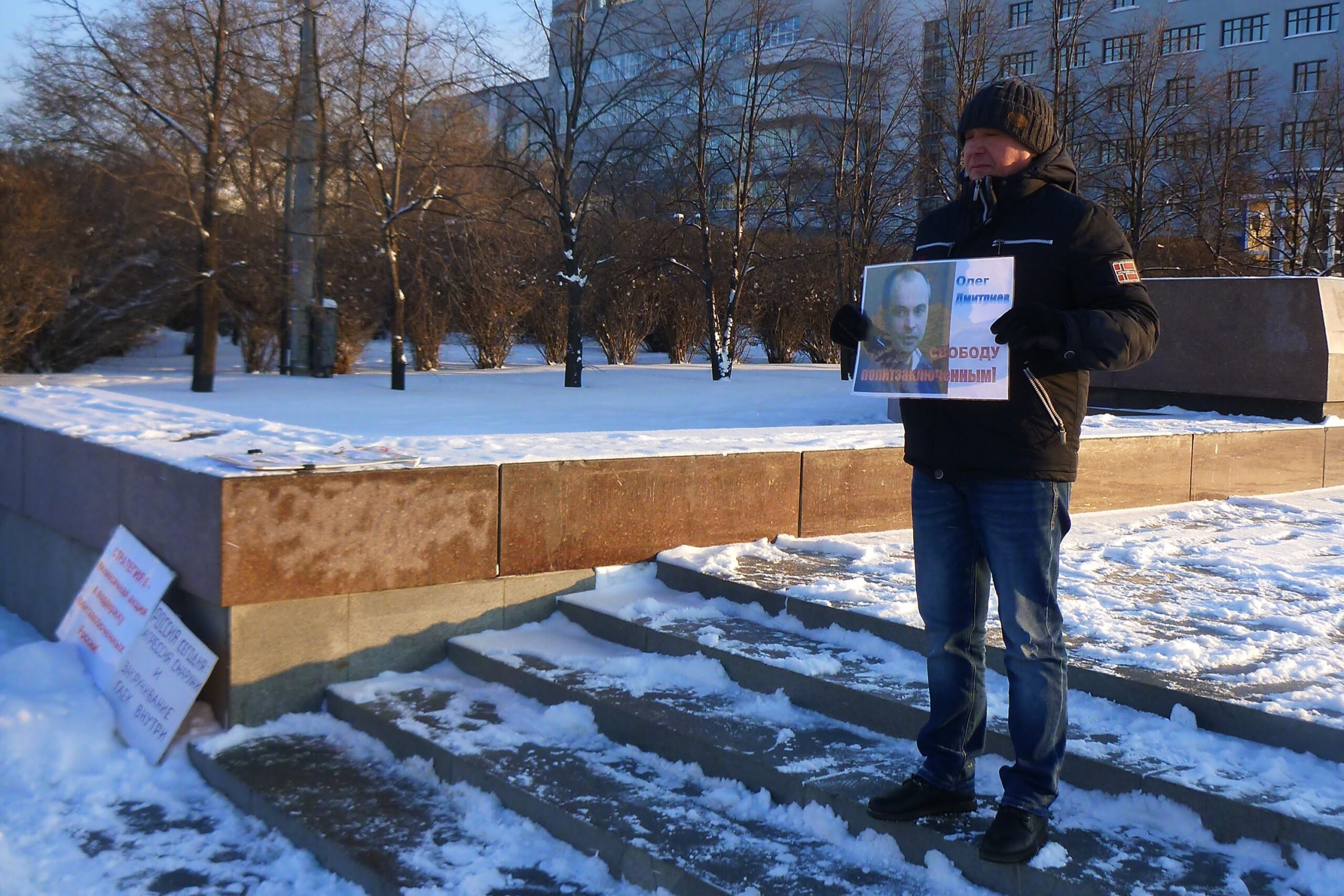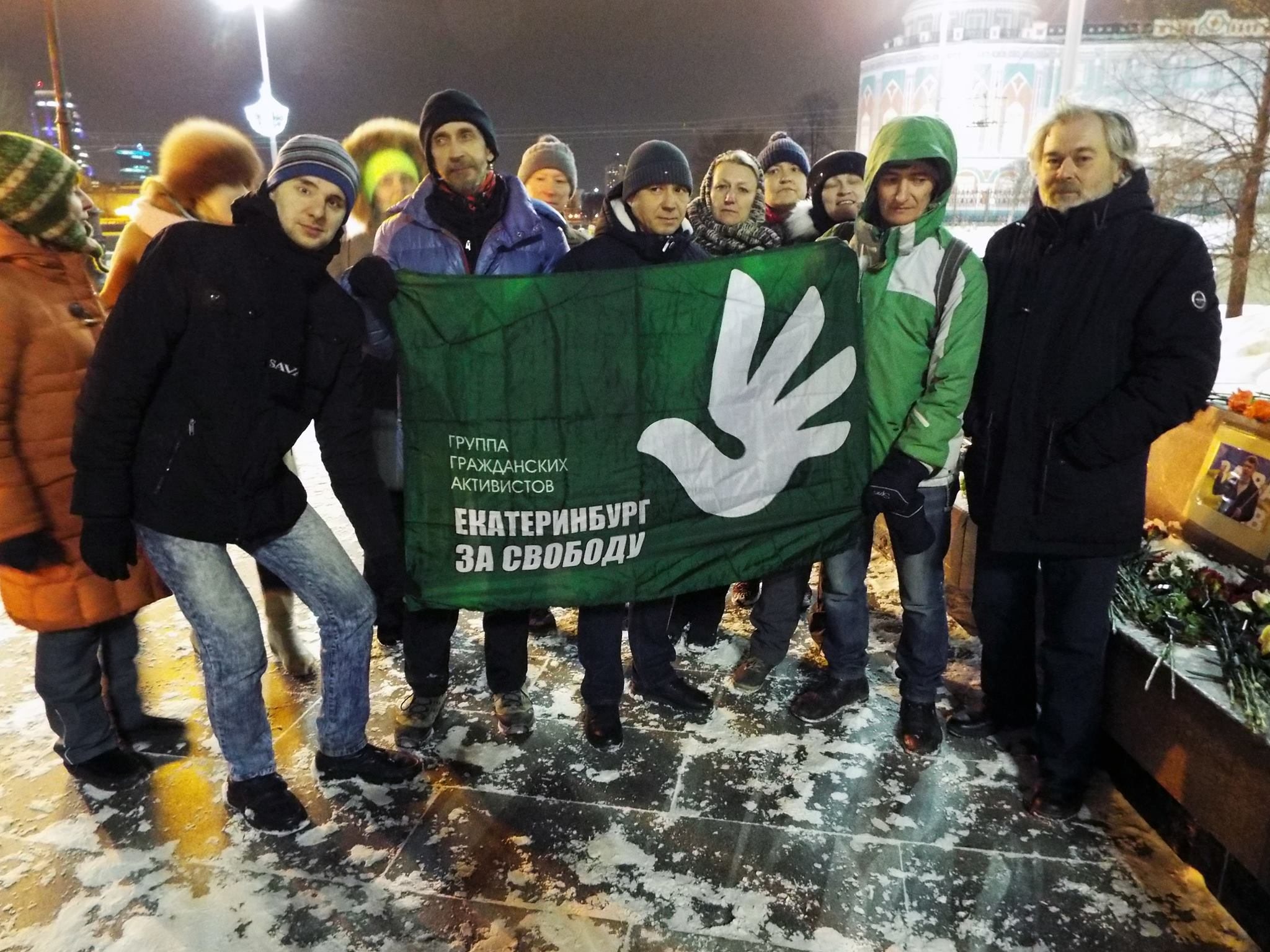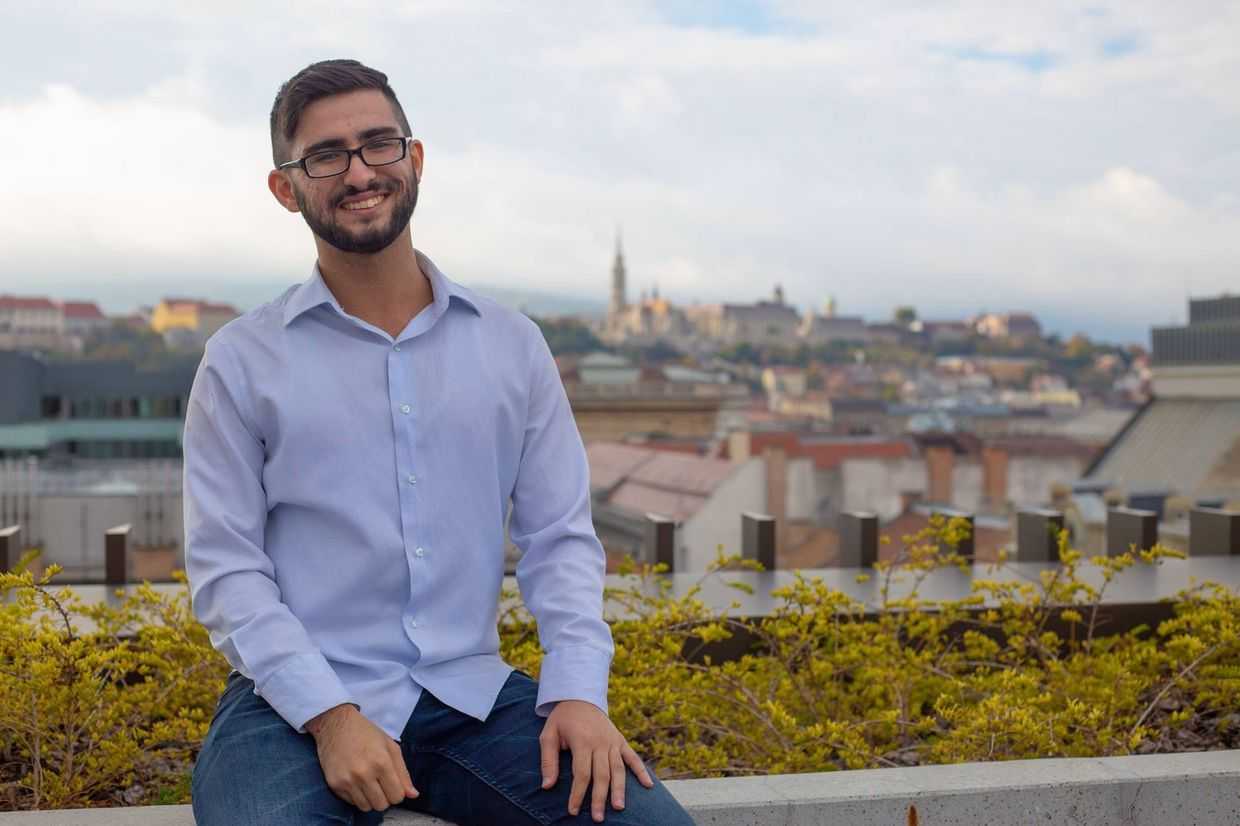From protesting in Georgia to arrest in South Ossetia: what happened to Rafail Shepelev?

In October, a Tbilisi-based Russian activist appeared in a prison in Russia’s Vladikavkaz. But how did Rafail Shepelev get to Russia, and why does he appear to have done so through South Ossetia?
‘Gamarjoba, Sakartvelo! Zhyve Belarus! Alga Kazakhstan! Russian ship, go to the ocean floor! Glory to Ukraine!’ — these words were Shepelev’s standard opening to his live videos on YouTube and Facebook, usually broadcast while protesting in front of Georgia’s parliament.
Shepelev had moved to Georgia from Yekaterinburg in 2021, after it became apparent that continuing his political activism in Russia looked set to lead to his long-term imprisonment.
But that fate appears to have befallen Shepelev regardless.
At the beginning of November 2023, Russian human rights group Perviy Otdel reported that on 13 October, a court in the Russian republic of North Ossetia had first found Shepelev guilty of petty hooliganism, and then rearrested him on terrorism charges after 15 days of administrative arrest — a routine tactic applied to government critics in Russia.
The news came as a surprise to many of those who knew Rafail, and had assumed that he remained in the central Tbilisi hotel that he had been living in.
Russian activists and human rights monitors also raised concerns that the Georgian authorities might have handed Shepelev over to Russia; a worrying but plausible prospect in light of the government previously barring entry to Russian journalists and activists, and seemingly assisting Azerbaijan in detaining Azerbaijani journalist Afgan Mukhtarli in Georgia.
The Georgian government was swift to deny this, stating he had been detained after crossing into South Ossetia. But it remains unclear why Shepelev would have done so.
Evgeniy Smirnov, a lawyer with Perviy Otdel, told OC Media on 14 November that the organisation had tried to provide Shepelev with legal services. However, Shepelev’s transfer from Vladikavkaz to the place where his preliminary investigation was to take place was already underway, with his destination remaining unknown. Smirnov added that in Russia, such a transfer could take two to four months.
‘He didn’t have the opportunity to talk with an independent lawyer. We are waiting for the end of his transportation so that a lawyer can visit him’, Smirnov told OC Media.
Political activism in Russia and Georgia
OC Media spoke to Shepelev in August 2022, as he stood in his customary spot in front of the parliament in Tbilisi demanding freedom for imprisoned Georgian ex-president Mikheil Saakashvili.
He identified himself as a supporter of Vyacheslav Maltsev, the founder and leader of Artpodgotovka, a Russian far-left anarchist movement.
In 2017, the Russian authorities cracked down on the movement, designating it an extremist group, and arrested activists including Shepelev after its leader declared 5 November 2017 a day of ‘peaceful revolution’.
‘All of our members are serving [time in prison], they’ve been given prison sentences from 8 to 13 years, for “terrorism”. They planted bottles with inflammable liquid and pistols on them and engineered criminal cases’, said Shepelev.
Shepelev added that Yekaterinburg’s opposition political movements were particularly active, claiming that the city’s ‘opposition front’ was stronger than that of other, larger Russian cities.
‘When they arrested all of us on 4 November […] our supporters blew up everyone’s phones with calls — making calls to Moscow, to prosecutors, lawyers, members of parliament, public organisations, heads of police departments’, he said.
In 2020, a Russian court designated Artpodgotovka a terrorist group.

Shepelev had been in conflict with the Russian authorities at least since 2017, when he participated in an unsanctioned rally in support of opposition leader Aleksey Navalny. The next year, a court sentenced him to 33 hours of compulsory work, which Shepelev later successfully appealed at the European Court of Human Rights.
In October 2021, Shepelev was fined ₽10,000 ($140) for participating in a protest in Yekaterinburg. But by the time the court fined him, he had already left Russia for Georgia, arriving in the Georgian port city of Batumi on 19 September.
‘They started a criminal case against me for offending the government, and I had to flee. I decided I did not want to sit in prison’, Shepelev told OC Media. ‘I can be more useful here instead of being silenced [in prison] like what happened with Navalny’.

According to the North Ossetian court that heard Shepelev’s case, the case was forwarded to them on 13 October, a day after Russian troops appear to have apprehended him in South Ossetia.
Shepelev’s son, Danil Shepelev, confirmed to Russian independent news outlet Mediazona that Russian authorities had wanted Rafail on terrorism charges since as early as May 2023.
And on 9 November, Andrey Alshevskikh, a State Duma lawmaker from Yekaterinburg, appeared to gloat over his detention, noting that he had called on the Interior Ministry to investigate Shepelev the previous year for spreading material supporting terrorism on social media.
‘When it comes to extremists who have fled abroad, it’s all about patience. Sooner or later, they will return home and answer for their actions’, Alshevskikh added.
Entering South Ossetia
When news that Shepelev was in Russian custody first broke, there were widespread suspicions of the Georgian Government’s possible involvement.
Some recalled the 2017 disappearance of Afgan Mukhtarli, an Azerbaijani investigative journalist living in Tbilisi. Mukhtarli ended up in Azerbaijan after unidentified individuals kidnapped and transported him through the Georgian-Azerbaijani border — a case that remains unresolved.
[Read more: Mukhtarli identifies top Georgian security official as one of his kidnappers]
But following news of Shepelev’s arrest, the Georgian authorities reacted quickly to avoid the impression that this was a similar case.
On 9 November, citing eyewitness testimonies and unpublished CCTV footage, Georgia’s Interior Ministry claimed that on the day of his disappearance, Shepelev had travelled to the village of Kirbali, central Georgia, by taxi. The village lies on the border between South Ossetia and Georgian government-controlled territory. After arriving, they said, he crossed into the area controlled by South Ossetian and Russian authorities.
‘He voluntarily crossed the occupation line and went deep into the occupied territory’, the Ministry stated.
Residents of Kirbali have corroborated to local media that Shepelev entered South Ossetia of his own accord.
One stated that Shepelev had travelled to the village from Gori alone by taxi, adding that he had promised to pay the driver the rest of his fare on his way back from Lomisa, a church in an area under South Ossetian control.
On 16 October, Davit Katsarava, leader of the Georgian vigilante group Power in Unity, published footage of what may have been Shepelev’s final moments of freedom. The footage appeared to show an unidentified person crossing into South Ossetia from Kirbali on 12 or 13 October.
Weeks before he himself was killed by Russian troops, Kirbali resident Tamaz Ginturi informed the media that he had tried to dissuade Shepelev from crossing over to South Ossetia.
[Read more: Russian troops fatally shoot Georgian in South Ossetia]
Both Shepelev and Ginturi seem to have had the same destination — the Lomisa Saint George church, a site of annual pilgrimage in summer. In recent years, Russian border guards have restricted ethnic Georgians from visiting a shrine in the Lomisa church, raising its public profile as a symbol of the creeping borderisation of South Ossetia.
Outspoken, wherever he was
So why would Shepelev travel to a disputed Church in South Ossetia?
Some have suggested he could have been pressured to turn himself over by the Russian authorities, perhaps via blackmail or threats to his family.
But Sergey Zykov, a political activist from Yekaterinburg currently residing outside Russia, told OC Media he did not believe Shepelev would have knowingly surrendered to the Russian authorities.
Speaking to OC Media in August 2022, Shepelev made clear his views on Russia’s involvement in the conflicts in Georgia, deploring ‘Russians killing, and killing, and killing Georgians’ in South Ossetia and Abkhazia. He also made it clear he would not wish to end up in Russian prison.
Rafail was known for being politically outspoken and appeared fervently convinced of his ideas. Identifying as a Christian, he often used religious ideas in his political expression, including using the name Archangel Rafail on his social media accounts. Shepelev said in one of his videos that he believed it was God who led him to Georgia.
While Shepelev often joined others in Georgian and Russian anti-government protests, he appeared somewhat of a lone soul, bearing his own message even when that did not entirely align with those of others. He appeared unafraid of confrontation.
In one incident, the European Georgian party physically removed Shepelev from their demonstration because they did not want to have Saakashvili’s banner at their event.
While in Georgia, Shepelev had become particularly involved with a small group of diehard Saakashvili supporters who can regularly be seen outside parliament demanding the former president’s release.
Rafail would often spend hours for days in a row on Rustaveli Avenue, alone or amongst a very small group of fellow activists, holding a photograph of the former Georgian president. He was keen to engage with passersby in Russian, often having spirited conversations with local detractors of Saakashvili.
For Rafail, Saakashvili appeared to represent what he wanted to see in his own country — a brave reformer and enemy of corruption, something he thought stood in opposition to everything that characterised Putin’s endless rule.
‘When he [Saakashvili] came into power in 2004, he made from Georgia, the ruins, the present-day Georgia’, Shepelev told OC Media in August 2022. ‘He’s the only person in the world capable of implementing the reforms he implemented in such a short time.’
Shepelev also made clear that he was not a fan of the incumbent Georgian government, calling them ‘collaborationists’ with Russia, and often criticised Georgians for tolerating the Georgian Dream-led government, which he claimed was ‘run from the Kremlin’.
Shepelev appeared to see what he did as a calling, telling OC Media that ‘a slave’s collar is always lighter than a warrior’s armour’.
But at least at the time, there was no indication that he saw his calling taking him to South Ossetia.
And so the exact circumstances that led Shepelev to travel to South Ossetia, and the events surrounding his arrest, remain unclear. And if he remains caught in the Russian prison system, as appears increasingly likely, it may remain so indefinitely.
Georgia’s Interior Ministry did not respond to OC Media’s enquiries regarding the case.









